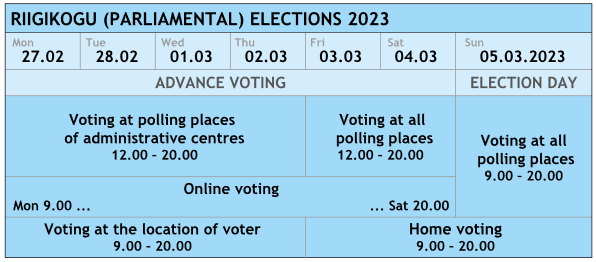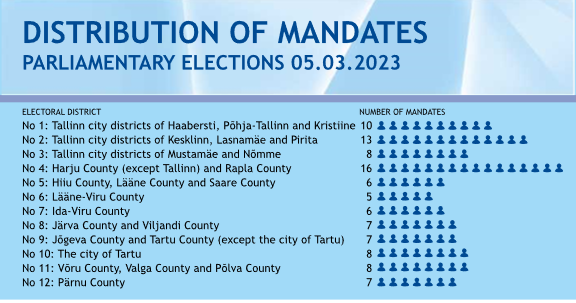Riigikogu Elections – 5 March 2023
ELECTION WEEK
Voting takes place during one week, from 27 February to 5 March.
- From Monday to Saturday, it is possible to vote either by ballot paper in a polling place, or online (i-voting).
- On the election day on Sunday, only voting by ballot paper takes place. The voter can annul their online vote (i-vote) by voting with a ballot paper at a polling place on Sunday.
- From Monday to Thursday, at least one polling place where voters can also vote outside the voting districts of their residence is open in each rural municipality and city.
- On Friday, Saturday and Sunday, it is possible to vote only at the polling places of the voting districts of the electoral district of the voter's residence.
- Home voting is held from the Friday to the Sunday of the election week. Applications for voting from home can be submitted by phone from 12 noon to 8 p.m. on Friday and Saturday, and from 9 a.m. to 2 p.m. on Sunday.

FLEXIBLE CHOICE OF POLLING PLACE
Voters can vote at the polling place that suits them best within their electoral district. This is made possible by the electronic list of voters, i.e., the list is now on computer instead of paper.
The locations of polling places can be found on the elections information sheet and on the website valimised.ee. Information is also provided through the national helpline 1247.
AT THE POLLING PLACE
- The voter is identified with an identity document (passport, ID card or driving licence).
- After that, an official at the polling place makes a notation in the electronic list of voters that a ballot paper has been issued to the voter.
- The voter receives a ballot paper against a signature on paper. Polling places have special signature sheets for that.
- The voter goes to the voting booth, where they write the number of their preferred candidate on the ballot paper.
- Before a folded ballot paper is dropped in the ballot box, a polling place official affixes a seal to the outside of the folded ballot paper.
I-VOTING
- I-voting (online voting) is possible only on a computer.
- An ID-card with an ID-card reader, or a mobile-ID are necessary for identifying oneself and casting a vote.
- The i-voting application can be downloaded from valimised.ee website.
- In order to ensure safe and smooth i-voting, please check the following:
- the validity of your ID-card certificates;
- whether your computer has the latest ID-card software;
- whether your computer's operating system needs to be updated;
- whether your anti-virus software needs to be updated.
- Please note: It is possible to verify if/whether your i-vote reached the electronic ballot box with the help of a smart device (smartphone, tablet computer) within 30 minutes after casting your vote.
- Update your i-voting individual verification application or download it from Google Play or App Store application store.
- Use your individual verification application to scan the QR-code displayed on your computer screen after you cast your i-vote.
ELECTION INFORMATION SHEET
- Voters whose official @eesti.ee e-mail address has been redirected or whose e-mail address is in the population register will receive the information sheet by e-mail.
- Voters whose e-mail address is not known will receive then information sheet on paper.
- Voters will receive their information sheets by 23 February at the latest.
- The election information sheet contains general information on voting options as well as on the locations of all polling places in the rural municipality or city.
VOTING ABROAD
- At the Riigikogu elections, voting is also possible in the foreign missions of Estonia.
- Voting at foreign missions takes place on at least two days between 18 February and 23 February.
- In foreign countries, it is also possible to vote by post. A voter who wishes to vote by post will have to submit a written application to a foreign mission of Estonia by 3 February at the latest.
- Voters permanently residing in a foreign state are required to have a designated voting district. Voters who do not have a designated electoral district are not on the list of voters. In order to verify if you have been designated an electoral district, please contact abi@rahvastikuregister.ee.
- Voters permanently residing in foreign countries are designated electoral districts on the basis of their last place of residence in Estonia, or, where this is unavailable, on the basis of the voter's parents' or grandparents' last place of residence in Estonia.
- Voters living abroad will receive their election information sheets during the first week of January.
RIGHT TO VOTE
Estonian citizens who have attained at least 18 years of age and are not serving a prison sentence have the right to vote at the Riigikogu elections.
RIGHT TO STAND AS CANDIDATE
- Estonian citizens who have attained at least 21 years of age have the right to stand as candidates at the elections of the Riigikogu. Persons in active service in the Defence Forces and persons who are serving a prison sentence may not stand as candidates.
- Political parties as well as independent candidates can participate in elections.
- Political parties can nominate candidates in electoral districts.
- Political parties prepare their national lists of all their candidates nominated in electoral districts.
ELECTORAL DISTRICT
- The territory of Estonia is divided into 12 electoral districts for the Riigikogu elections.
- An electoral district is a territorial unit where specific candidates are nominated.
- Each district has a specific number of mandates that are distributed according to the number of eligible voters.
- The total number of mandates is 101, that is, the number of seats in the Riigikogu.

POLITICAL ADVERTISING
- Political outdoor advertising is allowed throughout the entire election period.
- Explanations on politics may also be given on the election day.
- Polling places must remain strictly free of advertising.
